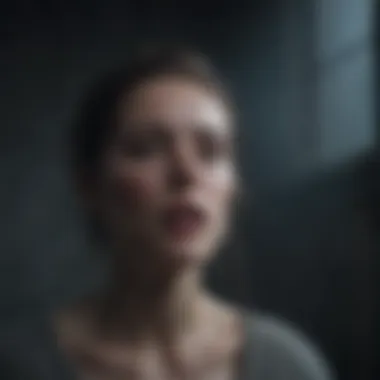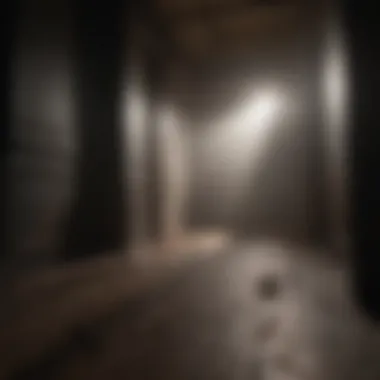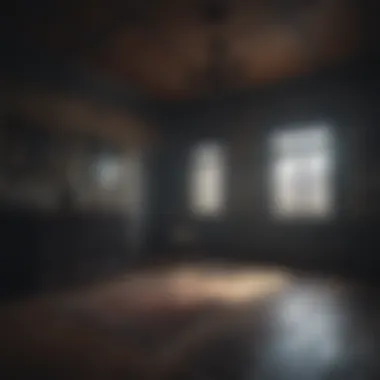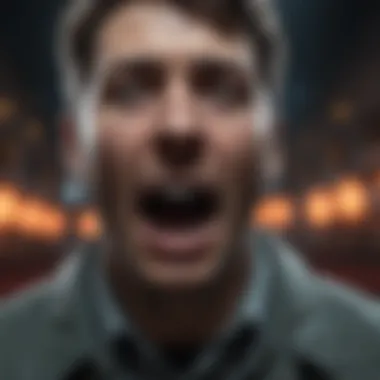Unveiling the Most Terrifying Films: Exploring the Top Five Scary Movies


Overview of Cinema/TV shows/Games/Comic Books
In the realm of horror cinema, viewers are constantly seeking the next thrill, the next spine-chilling experience that will leave them haunted for days. From iconic classics that have withstood the test of time to modern masterpieces that push the boundaries of fear, the landscape of scary movies is as diverse as it is terrifying. These films transport us to worlds where darkness reigns supreme, where every shadow holds a whispered secret, and where our deepest fears are brought vividly to life on the silver screen. Within this genre, exploration and discovery go hand in hand, guiding audiences through twisted narratives and heart-stopping moments that linger long after the credits roll.
In-Depth Analysis
When delving into the depths of these frightful tales, it is essential to unravel the intricate threads of plot that bind the audience to the unfolding terror. Each story is a carefully woven tapestry of fear, blending suspense, dread, and the unknown in a symphony of dread that keeps viewers on the edge of their seats. Characters in horror movies serve as vessels for our own fears, embodying concepts and phobias that strike a chord deep within our psyche. Through their development, we explore the darkness within ourselves, confronting the demons that lurk in the shadows of our subconscious. Setting and cinematography play a pivotal role in crafting the atmosphere of fear, using visuals and environments to immerse viewers in a world where every creaking floorboard and flickering light heralds impending doom.
Behind the Scenes
Beyond the scares that leap from the screen, the world behind the camera holds its own secrets and revelations. Interviews with the cast and crew offer insights into the creative process, shedding light on the arduous journey of bringing nightmares to life. The development process for horror games and comic books unveils the intricacies of storytelling in interactive and static mediums, exploring how fear can be harnessed and molded to elicit visceral reactions from audiences. Production insights for cinema and TV shows provide a glimpse into the meticulous planning and execution required to translate terror from script to screen, highlighting the dedication and artistry that breathe life into our darkest nightmares.
Reviews and Recommendations
As audiences navigate the multitude of horror offerings, critical and user reviews become beacons of guidance, illuminating the path towards the most bone-chilling experiences. Critic reviews and ratings offer expert opinions on scares and storytelling, evaluating the effectiveness of horror films in eliciting fear and unease. User reviews and comments provide a communal perspective on the impact of these movies, shaping discourse and highlighting hidden gems that may have escaped mainstream attention. Recommendation lists curate the top picks in horror cinema, guiding both seasoned fans and newcomers towards terrifying treasures waiting to be discovered in the shadows.
Introduction
In the realm of horror cinema, one finds a captivating array of films that evoke spine-chilling narratives and heart-pounding moments. These top five scary movies stand out as masterpieces, weaving tales of terror that linger long after the credits roll. From classic icons to modern gems, these films offer a unique blend of fear and fascination that grips audiences worldwide. Exploring the depths of horror cinema unveils a rich tapestry of storytelling and cinematic prowess that sets these movies apart.
Setting the Stage for Fear
Horror films hold a peculiar allure, drawing audiences into dark and immersive worlds where the line between reality and nightmare blurs. The allure of horror films lies in their ability to tap into primal fears and evoke visceral reactions from viewers. Through suspenseful storytelling and expert crafting of tension, horror films create an adrenaline-fueled experience that keeps audiences on the edge of their seats. This aspect sets the stage for fear by playing on our subconscious fears and challenging our perceptions of the unknown.
The Allure of Horror Films
The allure of horror films stems from their ability to explore themes of mortality, fear, and the supernatural in ways that other genres cannot. By delving into the darker corners of human psyche, horror films engage audiences on a primal level, eliciting a mix of dread and fascination. This unique characteristic makes horror films a popular choice for those seeking a thrilling cinematic experience that lingers long after the final scene fades to black.


The Impact of Scary Movies on Audiences
Scary movies leave a lasting impact on audiences, shaping their perceptions of fear, suspense, and storytelling. By immersing viewers in a world of terror and suspense, these films elicit emotional responses that range from sheer terror to nervous anticipation. This impact stems from the ability of scary movies to tap into our deepest fears and provoke introspection on mortality, morality, and the darker aspects of human nature.
Defining the Horror Genre
The horror genre has evolved over the decades, taking on various forms and styles that reflect the changing landscape of cinema and society. From the early days of Universal monsters to the modern era of psychological thrillers, horror cinema continues to push boundaries and redefine the art of scaring audiences.
Evolution of Horror Cinema
The evolution of horror cinema traces a fascinating journey through the annals of film history, showcasing the transformation of fright from Gothic tales to modern psychological horror. By adapting to cultural shifts and audience preferences, horror cinema has continued to reinvent itself, staying relevant in an ever-changing cinematic landscape. This evolution reflects a deep-seated fascination with fear and the supernatural that transcends time and trends.
Key Elements of a Terrifying Film
Key elements define what makes a horror film truly terrifying, from eerie atmosphere and jump scares to unsettling imagery and compelling narratives. These elements work in harmony to create a visceral and immersive experience that stays with viewers long after the lights come back on. By honing these key elements, filmmakers craft tales that resonate with audiences and stand the test of time as timeless classics.
The Art of Scaring
At the heart of horror lies the art of scaring, a delicate balance of tension, suspense, and fear that keeps audiences engaged and captivated. By employing a range of techniques and thematic elements, filmmakers create experiences that delve into the darkest recesses of human existence, challenging perceptions and evoking primal emotions.
Techniques Used in Creating Tension
Techniques used in creating tension play a crucial role in shaping the atmosphere and pacing of a horror film. From slow-burn suspense to sudden shocks, these techniques keep audiences guessing and on edge, never knowing what lurks around the next corner. Through the masterful use of sound, lighting, and cinematography, filmmakers build tension that culminates in heart-stopping moments of terror.
Psychological vs. Supernatural Horror
The debate between psychological and supernatural horror rages on, with each subgenre offering unique appeal and storytelling opportunities. Psychological horror delves into the depths of the human mind, exploring madness, obsession, and existential dread in ways that unsettle and provoke thought. On the other hand, supernatural horror taps into primal fears of the unknown and the supernatural, creating a sense of dread that lingers long after the credits roll. Both subgenres have their merits and drawbacks, offering audiences diverse narratives that cater to different fears and tastes.


Top Five Scary Movies
In this section, we delve into the quintessence of terror depicted in the top five scary movies. These films are not just a mere assemblage of fear-inducing scenes but represent a pinnacle in the art of horror storytelling. Each movie meticulously crafted to evoke spine-chilling thrills and keep audiences on the edge of their seats. The inclusion of these films in this article is a testament to their enduring impact on the horror genre, setting a benchmark for quality and fear-inducing narratives that captivate viewers worldwide. As we dissect each movie, we will unravel the intricate layers of fear, suspense, and the mastery behind cinematic terror, offering a comprehensive guide to the top echelon of spooky cinema.
Psychological Terror: 'Pschyco'
Dierctor's Vision: Alfrec Hitckocck
When we discern Alfred Hitchcock's directorial vision in 'Psycho,' we are plunged into a realm of psychological terror unlike any other. Hitchcock's meticulous attention to detail and manipulation of suspense set the groundwork for what is considered a masterpiece in terrifying storytelling. His ability to delve deep into the human psyche, exploiting primal fears and vulnerabilities, manifests in every frame of the film, ensnares the audience in a web of psychological torment. Hitchcock's use of camera angles, lighting, and sound amplifies the sense of unease, creating a harrowing experience that lingers long after the credits roll.
Impact on Cinematic History
The impact of 'Psycho' on cinematic history reverberates through the annals of filmmaking, solidifying Hitchcock's legacy as a pioneering force in the horror genre. This movie not only reshaped audience expectations of terror but also influenced an entire generation of filmmakers to push the boundaries of psychological horror. 'Psycho' stands as a testimonial to Hitchcock's unparalleled ability to elicit fear not through gore or jump scares but through the power of suggestion and suspense. Its lingering impact on the cinematic landscape serves as a timeless reminder of the potency of psychological terror done right.
Impact of Scary Movies
As we delve into the world of horror cinema, one cannot ignore the profound impact that scary movies have on audiences worldwide. The essence of fear and terror captured by these films transcends mere entertainment, delving into the very core of human emotions and psyche. Scary movies possess a unique ability to evoke visceral reactions, eliciting adrenaline rushes and spine-tingling moments that stay with viewers long after the credits roll. In this article, we will unravel the intricate layers of how scary movies influence culture, psychology, and the art of filmmaking itself.
Cultural Influence
Horror's Reflection of Society
Within the realm of scary movies, one can find a fascinating mirror reflecting the deepest fears and anxieties prevalent in society. The horror genre often serves as a canvas for exploring societal issues, taboos, and collective nightmares. By delving into these themes, horror films provide catharsis and an avenue for audiences to confront their innermost fears in a controlled environment. This aspect of horror cinema adds layers of depth, making it a compelling medium for societal introspection and reflection. The unique feature of 'Horror's Reflection of Society' lies in its ability to amalgamate entertainment with social commentary, creating a thought-provoking narrative that resonates with audiences.
Pop Culture Phenomena
The influence of scary movies extends beyond the confines of the cinema screen, permeating into the fabric of popular culture. From iconic monsters to memorable lines, scary movies have ingrained themselves in societal consciousness, becoming a part of the cultural lexicon. The widespread impact of these films is evident in various forms of media, including music, fashion, and even internet memes. 'Pop Culture Phenomena' encapsulates the phenomenon of how scary movies transcend their cinematic origins to become enduring facets of contemporary culture. This aspect serves as a testament to the lasting impression and significance of horror cinema in shaping popular discourse and artistic expression.


Psychological Effects
Adrenaline and Fear
At the core of scary movies lies the potent cocktail of adrenaline and fear, which acts as a driving force behind audience engagement. The thrill of being scared in a safe environment triggers a rush of adrenaline, heightening sensory perceptions and creating a palpable sense of excitement. 'Adrenaline and Fear' embody the emotional rollercoaster experienced by viewers, immersing them in a whirlwind of emotions that range from anticipation to dread. This unique feature of scary movies taps into primal instincts, allowing audiences to experience an adrenaline-fueled escapade through the realms of terror.
The Power of Suspension of Disbelief
A critical element that underpins the effectiveness of scary movies is the concept of suspension of disbelief. By temporarily surrendering rational skepticism, viewers immerse themselves in the fantastical worlds created by filmmakers, suspending their disbelief for the duration of the film. 'The Power of Suspension of Disbelief' enables audiences to embrace the impossible, opening the doors to a realm where the supernatural and horrific can coexist seamlessly with reality. This feature enhances the immersive nature of horror cinema, drawing viewers into a captivating narrative that blurs the lines between the plausible and the supernatural.
Evolution of Horror
Changing Trends in Scary Films
The landscape of horror cinema is a dynamic tapestry that evolves with each passing year, reflecting changing cultural, technological, and artistic sensibilities. 'Changing Trends in Scary Films' encapsulates the metamorphosis of horror across different eras, from the gothic horrors of the past to the psychological thrillers of the present. These trends mirror societal preoccupations and audience preferences, shaping the narrative conventions and tropes prevalent in modern horror storytelling. By understanding these shifts, we gain insights into the evolving nature of fear and the storytelling mechanisms employed to elicit terror.
Impact on Filmmaking Techniques
The evolution of horror cinema not only influences narratives but also revolutionizes the techniques and technologies used in filmmaking. 'Impact on Filmmaking Techniques' explores how advancements in special effects, sound design, and cinematography have redefined the visual language of horror films. From found footage to virtual reality experiences, filmmakers continually innovate to deliver fresh perspectives on fear and suspense. This aspect highlights the symbiotic relationship between technology and storytelling, showcasing how the tools of the trade shape the terrifying vistas depicted on the silver screen.
Conclusion
In delving into the unsettling world of horror cinema, this article provides a crucial insight into the top five scary movies that have entranced audiences with their bone-chilling narratives and heart-stopping moments. The exploration of these films not only elucidates the evolution of the horror genre but also underscores the enduring appeal of fear and terror in cinematic experiences. By dissecting the intricacies of each selected movie, audiences are poised to gain a deeper appreciation for the artistry and craftsmanship that goes into creating such haunting masterpieces. The significance of this examination extends beyond mere entertainment, as it sheds light on the profound impact that storytelling infused with dread and suspense can have on individuals and society as a whole, emphasizing the power of cinema as a transformative medium.
Embracing the Fear
The Enduring Allure of Horror Cinema
Embarking on a journey through the realms of horror cinema unveils a myriad of spine-tingling moments and psychological undercurrents that captivate audiences and leave a lasting impression long after the credits roll. The allure of horror lies in its ability to elicit primal emotions and tap into the visceral core of human nature. By exploring themes of fear, mortality, and the unknown, horror cinema serves as a mirror reflecting the collective anxieties and deep-seated fears that permeate society. This self-reflective quality elevates horror beyond mere entertainment, transforming it into a profound commentary on the human condition and the complexities of existence.
Expanding the Horizons of the Genre
As the horror genre continues to evolve and reinvent itself, filmmakers and storytellers are pushing the boundaries of traditional narrative structures and thematic conventions. By challenging audiences with innovative storytelling techniques and thought-provoking narratives, horror cinema is expanding its horizons and reaching new heights of creativity and ingenuity. The genre's ability to transcend cultural and societal boundaries, touching upon universal themes and fears, ensures its enduring relevance and popularity among a diverse range of viewers. By embracing diversity in storytelling and exploring new avenues of terror and suspense, horror cinema enriches the cinematic landscape and offers audiences fresh and thrilling experiences that defy expectations and redefine the boundaries of fear.

